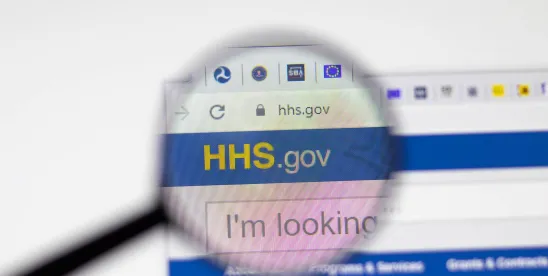Highlights
A favorable opinion from HHS-OIG involves a drug manufacturer covering the costs of meningococcal vaccines for patients with increased risk of infections due to the manufacturer’s drug treatments
The HHS-OIG found the proposed arrangement improved patient safety and access to treatment for several different rare disorders
The proposed arrangement included several factors that limited risk under the CMP and Anti-Kickback Statutes
The U.S. Department of Health and Human Services’ Office of Inspector General (HHS-OIG) recently released Advisory Opinion 24-11, a favorable opinion regarding the federal Anti-Kickback Statute (AKS) and civil monetary penalty laws against beneficiary inducements (CMP) as applied to free meningococcal vaccines provided by a drug manufacturer for patients who receive its treatments. The advisory opinion was requested by the manufacturer of infusion treatments for rare disorders whose treatments greatly increase a patient’s risk of meningococcal infections.
Due to various barriers faced by patients in obtaining recommended meningococcal vaccines prior to treatment, the drug manufacturer proposes to provide free vaccines to patients that: 1) have been prescribed one of the manufacturer’s treatments, 2) enroll in the manufacturer’s patient support program, and 3) have a prescription for a meningococcal vaccine (or vaccines). The patients will receive the vaccines after the manufacturer ships the vaccines to a third-party vendor contracted with the manufacturer, or the patient’s healthcare provider.
If the third-party vendor administers the vaccines, it will not bill any federal healthcare programs or third-party payors for any costs associated with vaccine administration. If the patient’s healthcare provider administers the vaccines, the provider must attest it will not bill any payor for the cost of the vaccines. However, they may still bill an administration fee of approximately $20 to the federal healthcare programs and other payors.
The HHS-OIG concluded the proposed arrangement implicated both the AKS and CMP and would not fall directly within any exception or safe harbor. However, the agency decided the risk of fraud and abuse is sufficiently low and it would not impose sanctions in connection with the proposed arrangement.
The HHS-OIG cited the following factors as limiting the possibility for fraud and abuse:
- The proposed arrangement’s chief value to patients is in the form of convenience and safety rather than in the form of financial value because, even absent the proposed arrangement. Medicare enrollees would not incur out-of-pocket expenses related to the vaccinations.
- The proposed arrangement is unlikely to result in inappropriate additional costs to federal healthcare programs because the vaccines are not billed to any payors, and healthcare providers administering the vaccines only bill federal healthcare programs for a nominal administration fee.
- To the extent those administration fees increase costs to federal healthcare programs, those are costs that the government – through the Food and Drug Administration (FDA) – has actively encouraged in its Risk Evaluation and Mitigation Strategy (REMS) with Elements to Assure Safe Use (ETASU) requirements.
- The proposed arrangement would likely lower the costs incurred by federal healthcare programs because the vaccines are provided for free by the manufacturer.
- The nominal administration fee is unlikely to motivate a provider to order more products from the manufacturer.
- In most cases, the provider ordering one of the manufacturer’s treatments is not the same provider who administers the vaccine, so the administration fee is not likely to corrupt the medical decision-making of the ordering provider.
- The manufacturer does not provide any additional free treatment which could influence a patient to select and receive the manufacturer’s drugs.
As a result, the HHS-OIG determined the proposed arrangement was low risk and it would not impose sanctions on the drug manufacturer in connection with the arrangement.
Takeaways
This opinion, like several previous opinions, continues to demonstrate leniency by the HHS-OIG toward arrangements that improve patient safety and access to patient care without significant risks of fraud and abuse. Drug manufacturers should continue to revisit and review their patient support programs in light of the guidance provided in these opinions.






 />i
/>i

